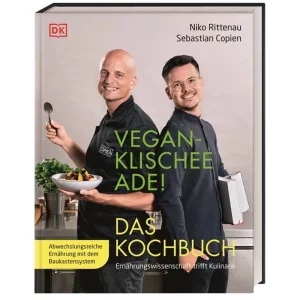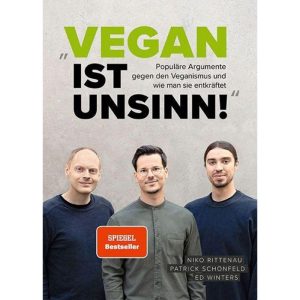What are typical prejudices about vegan substitutes for meat, cheese and other animal products? If you're looking for an answer to this question, you've come to the right place! From chemical mace to calorie bomb - there are numerous myths and misconceptions about vegetarian and vegan alternatives. These are often based on half-knowledge or are deliberately spread.
In this article, I would like to critically examine the most common prejudices, check the facts and show why many of these claims are simply wrong. Let's go!
Background: Why are there so many prejudices against vegan substitute products?
Many general prejudices against veggie alternatives result from Ignorance and Reservations about changes and social norms. Most people have been eating meat since childhood and see it as "the norm" - and plant-based alternatives as an unnecessary intrusion into their eating habits.
In addition misleading reporting and false information, the through targeted lobbying The growing market for plant-based products is being slowed down by interest groups.
10 examples: What are the prejudices surrounding plant-based substitutes?
The Combination of skepticism, misinformation and fear of change ultimately leads to numerous myths that persist.
Here I would like to name and refute precisely the prejudices that circulate particularly frequently in the media or mentioned in personal conversations.
Prejudice 1: Vegan substitute products are full of mineral oil!
Öko-Test has indeed mineral oil residues in some plant-based burger patties established that from the industrial process originate. However, as this is not uncommon in products processed by machines, the consumer protection agent could also be found in Parmesan cheese, eggs, salami pizzas and Sausages made from animal meat Detect mineral oil contamination.
It is therefore a valid argument - albeit one that can be used against both vegan substitute products and also against animal products. The positive side: fortunately, these are only Very small quantitieswhich are harmless to health but generally emphasize that processed foods should only be eaten in moderation.
Important: You can't make a blanket statement that vegan meat substitutes are chemical clubs. However, your concern should be clear when it comes to animal meat, as the antibiotic residues it contains can cause life-threatening resistance.
2nd prejudice: Vegans imitate meat because it tastes good!
Most vegans listen to not for reasons of tasteto eat meat and other animal products. Rather Ethical motives The main reason for switching to meat-like products. They want their vegan lifestyle simply do not kill animals.
Meat substitutes allow vegans and vegetarians to Enjoy the taste you are used towithout causing animal suffering. It is therefore a practical compromise between pleasure and ethics - and the prejudice (or rather this accusation) is not true.
As a vegan I only eat substitute products very rarely these daysas I now have so many wholesome and fresh vegan recipes to hand.
3. prejudice: plant-based substitute products contain paste!
This myth relates to the additive methyl cellulose (E461), which is also a component of many wallpaper pastes, but is no whole paste is.
The Gelling and thickening agents is also found in many processed and mostly processed foods (e.g. mayonnaise, ice cream or animal sausage) and is rather harmless according to the consumer advice center in Hamburgbecause it is excreted by the body.
So the statement is not only wrong, but also misleading. Ultimately, this misinformation unfortunately also reinforces prejudices such as "vegan substitute products are plastic food".
4. prejudice: vegan substitute products are real fatteners!
This prejudice is based on the blanket assumption that all vegan alternatives are rich in saturated fatty acids be and a high calorie content should have.
Although there are some substitutes for meat or cheese to which this applies - but The animal counterpart is no different. The latter is often even higher in calories and therefore more likely to make you fat.
Here is an example Direct comparisonto confirm this:
- Vegan mill salami (Rügenwalder Mühle)* provides 137 kcal per 100 g. The fat content is 9.2 g, of which 0.7 g is saturated fat. Gutfried poultry salami provides 173 kcal and has a fat content of 9 g with 2.7 g of saturated fatty acids.
- Mild gourmet slices (REWE) provides 286 kcal per 100 g and has 21 g fat, of which 18.4 g is saturated fat. The comparable Gouda Holland jung Scheibenkäse (REWE) has 382 kcal and 31.3 g fat, of which 21.7 g is saturated fat.
5. prejudice: plant-based substitutes are far too expensive!
A look in the supermarket actually shows that Vegan substitute products often (still) more expensive than conventional meat. This is mainly due to the still lower (but growing) demand and higher production costs for innovative, plant-based formulations. The more people switch to plant-based alternatives in the future, the cheaper they will become.
Discounters like Lidl have the prices for their meat substitutes have already been adjusted to comparable animal productsso that the argument no longer works there.
In principle, you should also use the hidden costs of cheap meat such as climate damage or animal suffering. Sustainable consumption has its price - and is often worth it.
Good to know: Apart from that, vegan foods such as rice, pasta or pulses are the cheapest foods in the supermarket. It So going vegan doesn't have to be expensive. The prejudice is mainly based on the initially high prices of the substitute products.
6 Prejudice: If you want to eat meat, you don't need a meat substitute!

This prejudice suggests that meat substitutes is not for people who like to eat meat - and that there is therefore no need to even consider vegan and vegetarian alternatives.
But on the one hand, you can eat both variants, depending on what you feel like eating and what is compatible with your own values. And on the other hand the meat alternatives to the countless meat fans, the Eat less meat or want to master the transition to a vegetarian-vegan diet.
Here are a few Vegetable meat alternativesthat you should definitely try:
- Beyond Burger (Beyond Meat) (is available here*)
- Meat Steaks Smoky BBQ (Green Legend) (is available here*)
- Chicken fillets Sweet Pepper (Green Legend) (is available here*)
7 Prejudice: Vegan substitute products are full of flavors!
Plant-based alternative products are often regarded as chemical clubs because often sneak flavors, flavor enhancers and other additives into their list of ingredients, in order to Imitate the taste or appearance of the animal version.
The aforementioned prejudice is true as far as it goes - but also back to conventional meat and cheese products and to many Processed finished products to.
However, the substances are considered harmless to health. You must be tested and approved by the European Food Safety Authority (EFSA). I personally would have greater fears about Harmful substances in animal productssuch as heavy metals, antibiotics and pus and fecal residues.
I enjoy vegan substitute products with flavors and additives in moderation to be on the safe side and instead cook more freshly with unprocessed plant-based ingredients, e.g. lentils, tofu or seitan, which have been awarded the Bioland or Demeter seal.
Important: Here I have collected prejudices against vegan substitute products and not against vegan unprocessed foods. There are thousands of the latter, so of course you can easily find Eat a vegan diet completely without substitute products can. 😉
8 Prejudice: Vegan meat substitutes contain no protein.
This myth is also persistent and unjustified. There are an incredible number of purely plant-based protein sources (e.g. Soy, lentils, peas, beans, oatmeal or Buckwheat) and, accordingly, a variety of protein-rich meat substitutes. Their protein content is often even higher than that of their animal counterparts.
The blanket claim that vegan meat substitutes are low in protein or contain no protein at all is therefore simply wrong. Also You can build muscle with a vegan diet.
Here again an example for clarification:
Vegan mince (Like Meat)* has 20 g protein per 100 g. METRO Chef's minced beef, on the other hand, only has 18 g of protein.
9. prejudice: vegan substitute products contain too much salt!
Although some vegan substitute products are actually quite salty - the but also applies to many processed animal foods.
Of course, you can argue about what is "too much salt". However, a direct comparison between similar product types shows that the Salt content of cheese alternatives or sausage or meat products often even higher and is therefore even more questionable.
Here are two Examples:
- The mild gourmet slices (REWE) contain 1.6 g of salt per 100 g, while the comparable Gouda Holland jung Scheibenkäse (REWE) contains 1.8 g.
- The Vegan mill salami (Rügenwalder Mühle)* contains 2.7 g of salt per 100 g, while Gutfried's poultry salami contains 3.8 g.
One more thing: The World Health Organization (WHO) recommends the daily consumption of maximum 5 g salt per day. As one packet of vegan salami weighs 80 g, you would have to eat more than two packets at breakfast to exceed the maximum recommended daily amount.
The prejudice may be true in many cases, but it does not stand up to direct comparison with animal products. And if this comparison is not communicated, the statement is even misleading.
10 Prejudice: Rainforest is being cleared for vegan substitute products!
The argument Soy destroys rainforest is a real classic among prejudices and has been refuted dozens of times. The Assertion is not only false - In fact, the complete opposite is the case. Around 80 percent of the global soybean harvest is processed into animal feed and around 18 percent to biodiesel and oils.
From only about 2 percent soy milk, tofu schnitzel and other vegan foods are produced that we humans consume directly. As a rule, this is European organic soy from GMO-free agriculture. Genetically modified soy is not even approved as a foodstuff for end consumers in Germany - but it is approved as animal feed.1
Always critically question preconceptions about vegan substitute products!
There are sooo many Prejudices against veganism - but they circulate in raw quantities, especially in vegan substitute products. To protect animals, they are definitely always the better choice. And whether they are unhealthy or not, you should always check critically and make sure a comparison with the animal counterpart to use.
I personally abstain from animal products such as meat, eggs and cheese and enjoy vegan convenience products relatively rarely. Instead, I cook more myself - for example with tofu, tempeh and pulses.
If you also have a healthy lifestyle is important, it is worth paying attention to quality: The best way to do this is to follow the Organic or Demeter seal on the packaging. You will find a large selection, for example here online at velivery.com*.
"Animals are my friends and I don't eat my friends."
George Bernard Shaw, Irish playwright and pacifist (1856-1950)
Do you have any questions, suggestions or have you heard of other prejudices against plant-based substitutes? Then write me a message in the comments!
Stay open to change,

PS: Chips and cola are also vegan. So vegan is not automatically healthy! You can now find out what you should consider for a healthy, purely plant-based diet in the linked article.
References:
- Albert Schweitzer Stiftung für unsere Mitwelt: Why soy sausage does not harm the rainforest (as of 01.06.2018). https://t1p.de/jzvz. [06.12.2024]. ↩︎









